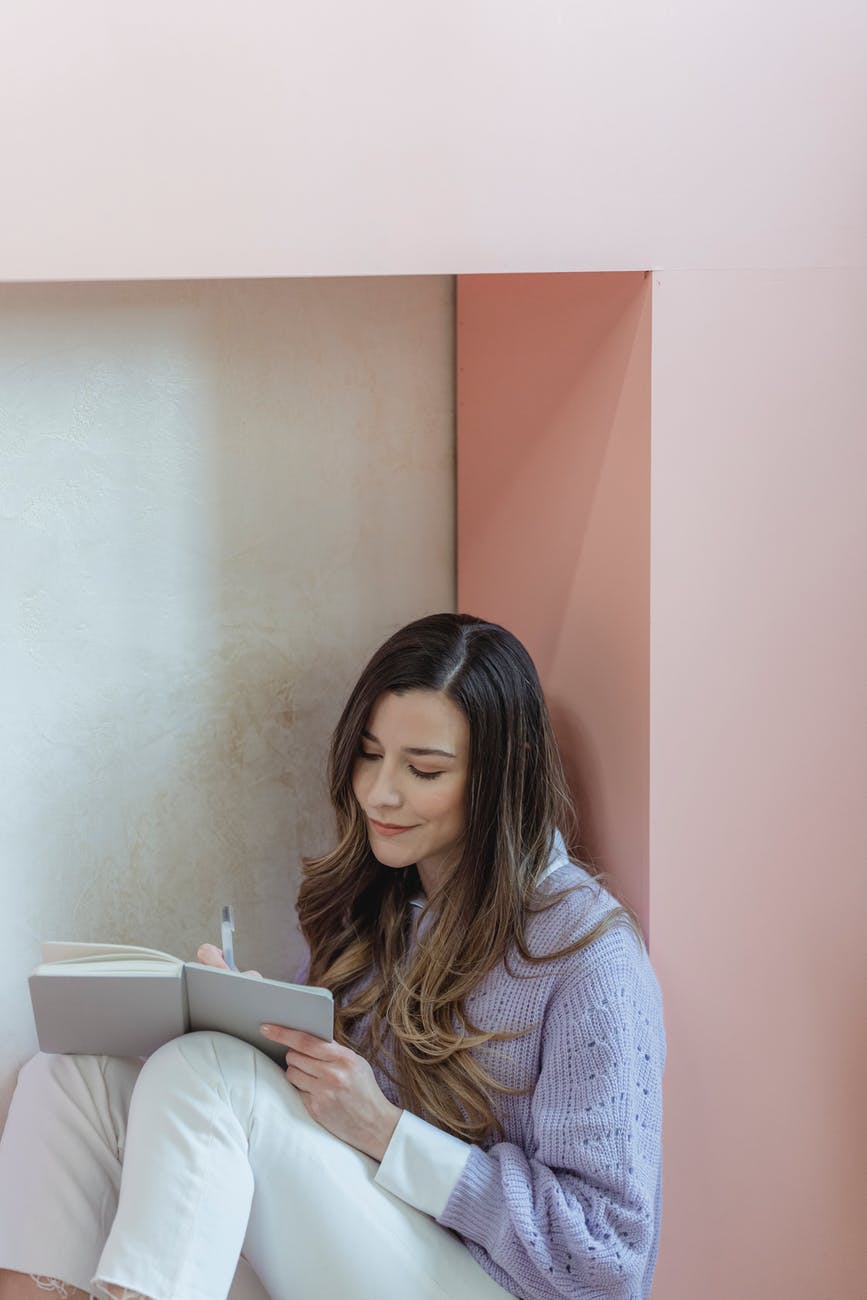Your habits and routines should serve you. They should help you to keep order and organization, stay on top of important commitments, and even provide structure for those consistent pieces of your day-to-day.

Healthy habits and routines are important and powerful and an important part of being self-aware.
What’s the difference between habits and routines?
Habits are actions that you do regularly, and some would argue that in most cases they happen automatically.
While routines contain a course of actions that are done consistently. And having routines in place is what actually leads to good habits.
Routines allow us to save time by not having to make decisions. They can support you, your vision, and your goals, or they can work against what you actually want.
We all have routines, but few of us actually chose our routines. We just seem to fall into them, and we keep our routines unless they’re obviously failing.
Your current routines might be okay, but are they bringing you closer to your goals? Do they support your values and priorities? Are they helping you to build good habits?
Examine your daily routines and determine how well they serve you.
Try these tips for easing into new routines

Plan ahead
Eliminate excuses by plotting out your plan in advance. If you want to wake up an hour earlier, go to bed on time or even early. Visualize the invigorating yoga class and delicious breakfast that awaits you in the morning.
Be consistent
Regularity reinforces itself. With consistent effort, it will be easier to go to the gym after work rather than changing your mind, even if it’s raining or your colleagues are heading out for beer and pizza.
Recognize your triggers
Kicking a habit requires you to notice what happens right before biting your nails or buying another pair of shoes. Are you bored at work or arguing with your spouse?
Develop substitution
Once you know your triggers, you can choose a different response. Take a walk, exercise, or change your environment.
Examine your motives
Go over the reasons why you want to adopt your new behavior. Remind yourself about how drinking water instead of soda will help you slim down, strengthen your bones, and save money.
Personalize your goals
While you’re contemplating your reasons, visualize your future self. Focus on what you have to gain for yourself instead of simply doing things that you feel will be pleasing to others.
Advanced Strategies for Habit Formation
Some things in life require an extra push or a little bit of extra effort. What if you’re tackling something as ambitious as managing an illness or transforming your dating history that has yielded less than satisfactory results?
Here are some ideas to give you an extra bit of inspiration:
Practice compassion
I set a goal of riding my exercise bike every morning when I wake up. At least on the weekdays. But some days I wake up and I just can’t do it. Or I flat out do not want to. I give myself grace and either try to make it up on the weekend or that evening if I am up to it.
If not, I tell myself that the next day can be Day1 for me, which is okay.
When setting new habits and making routines from them, you may slip up occasionally. Forgive yourself, and move forward.

Partner up
Enlist a friend so you can exchange support and encouragement, and accountability.
In everything that I do, I try to form some form of partnership for accountability and encouragement. I do this because forming new habits, accomplishing goals, and overall growth and change can get really lonely.
Trying to lose weight? Eat lunch with a colleague who is trying to lose weight too. So you guys both pick a place that is conducive to your goals.
Write it down
Increase your awareness and personal accountability by keeping a journal about your goals. Note what happens on the days you stick to your program compared to the days when you drift back into old patterns. Write down how it feels and what changes need to be made to make you feel good about the changes you are making.
Remove temptations
Eliminate the triggers that distract you from your goals. Clear the junk food out of your kitchen or the cigarettes out of your car. Pack snacks so you don’t impulsively eat. Set yourself up for success, by limiting the temptations, where you can.
Design obstacles
Make it difficult for you to just give in to your old tendencies.
Compulsive spending? Leave your credit cards at home to prevent impulsive shopping sprees.
Overeating? Meal plan with pre-measured portions and drink water after you are finished eating until you feel “full” or satisfied.
Eating too much junk? Buy more fruits ad healthy snacks to curb your sweet tooth.
Go away
Leave home for a while. Vacations are an ideal time for forging new habits. Because you can make a fresh start in different surroundings. Sit down to meditate each morning instead of becoming caught up in searching for lost socks or checking your email.
Make daily exercise and parallel parking so easy you won’t even have to think about them. Positive habits make advantageous choices automatic so you’ll stick with them. You’ll also have more energy to devote to other challenges that life brings.
Can you make some small changes here and there that would serve you better? Even a small modification in a routine can make a big difference because they’re performed consistently. Over time, these actions add up.
Create your routines
Ask yourself these questions about your current routines – whether they are default routines, which we just fall into; or planed routines, which are created and set with intention, to determine if they are serving you.

Morning routine – How are you starting your day?
This is about the time from when your alarm goes off until you’re out the front door, what do you do with that time?
Here are some questions to ask yourself to create a morning routine that serves you.
- What time do you get up? What time do you NEED to get up? Do they match? Do you need to make adjustments?
- How many times does your alarm go off before you wake up? Do you let your alarm go off several tim which most likely makes you late? If so, you may need to move your alarm where you have to get up to go and turn it off to get you moving.
- What do you think about while lying in bed? When you get up do you allow yourself to see what comes up for you? Do you instantly grab your phone and start scrolling? If you have anxiety filled thoughs, you may need to examine those to see where they are coming from and what you need to do about them.
- What do you have for breakfast? Do you even eat breakfast? Are you providing yourself with something that helps give you energy necessary to starting your day and facing the tasks in front of you? Make sure that you are eating a balanced breakfast there are tremendous health benefits to making sure that you have breakfast.
- Do you do anything besides eating and getting ready for work? What do you do? Do these extra things help towards your goals for your day, or are they adding additional frustration. Are you stopping to gran coffee everyday, causing your to run late or get stuck in traffic? If so, you may need to get up earlier to accommodate that or make coffee before you leave home.
Work routine – Are you being productive during your work hours?
- Are you taking the best route to work? There are severa different apps you can use for directions. The Waze app is my favorite because it reports crashes, where police are, obects in the road and a whole host of other things that can affect yor commute. Even though you know how to get there, it is beneficial to plug it into your GPS every day so you can get alerted to alternate routes and whatnot when necessary.
- Do you get gas before work or after? If stopping to get gas throws you off in the morning, you may need to plan to get gas the evening or night before as part of your evening routine. This can reduce rushing and anxiety in the morning.
- How do you use the time in your car? Do you talk on the phone, listen to your favorite podcast, or just vibe out to your favorite music. MAke sure that you are doing what you need each day. If you need silence or to listen to your music, send that call to voicemail. If you find it refreshing to learn something new, catch the news, or just have a good laugh, listen to your favorite podcast. Do what is best for you!
- How early do you arrive at work? Are you sliding in by the skin of your teeth? Or do yo make it in with enough time to not be frazzled when you are making it in the door? Be mindful of how you start your day. Especially if you work in a public facing position.

Meals – Is your diet supporting your health and activity goals
- What are your eating routines? Do you eat three times a day? Or do you eat when you think about it? Be mindful that your body needs food for fuel. It is recommended that you eat several small meals throughout the day, followed with healthy snacks in between.
- How do you choose your meals? Do you eat what you want and hope for the best? Or are you taking your diet and health into consideration?
- Do you buy your lunch or bring it to work? Studies have shown that not only do people who pack their lunch save money, they help save their waistline as well.
- Do you prepare healthy meals ahead of time or just throw together what you can at the last minute? Meal planning and buying groceries that you need help to make sure that you are consuming thought out balanced meals.
Evening at home – How are you spending your down time?
How do you spend your time after you get home from work? Think about your household chores and the time you spend with your family. Are you making positive memories with your loved ones? How?
- What hobbies do you spend time on?
- How do you use the time before bed?

Weekends – Are they all work, all play or a healthy combination of both?
How do you spend the weekends? What are your weekend routines?
The weekend for most people is a mix of home responsibilities (work) and a bit of doing fun things like hanging with friends, shopping, and attending events (play). Your weekends should always have something to look forward to. Even if that something is just relaxing on the couch.
- Do you go out for doughnuts every Saturday morning?
- Do you attend church?
- Is Saturday afternoon family time?
- Or do you hang with friends all weekend?
Evaluating Your Routines
After you have routines in place, it is important to occasional evaluate them.
What is your general impression of your routines? Are there any obvious weaknesses or places where you’d like to something different? Do they serve your goals and overall mental and emotional well-being?
Identify wasted time
Look at your routines and determine how much time you’re wasting each day. Include all non-value activities, like watching TV. While there is nothing wrong with sitting down and relaxing to watch your favorite shows. If it is at the expense of making sure you have clean clothes for the week and the necessary groceries, you might be shocked by the number of hours you’re wasting.
Start thinking about how you could better use that time.
Examine your goals, values, and priorities
Take a few minutes to jot these down. It’s not really possible to evaluate a routine without having criteria to evaluate against. This is an important step. If you don’t know what’s important to you and what you want to accomplish, you’re most likely wasting a lot of time.
Also, consider the challenges you’re currently facing in your life. Are your routines helping, harming, or having no effect on overcoming your hurdles and obstacles?
Now, go back and create routines that make sense for you. Consider your current challenges and goals:
- What activities can you do each day that support what you’re trying to accomplish?
- Are there things you can do each day that will move you closer to your goals?
- What is the best way to use your time in each of your routines?
You might be able to accomplish more in the morning than just getting to work on time. With a proactive pre-bedtime routine, you could teach yourself a language or a new skill that could help your career.
Defining and understanding what you want to accomplish and achieve in this stage of your life helps to set yourself up for success with effective routines.
You can accomplish anything with effective routines. What are yours?



